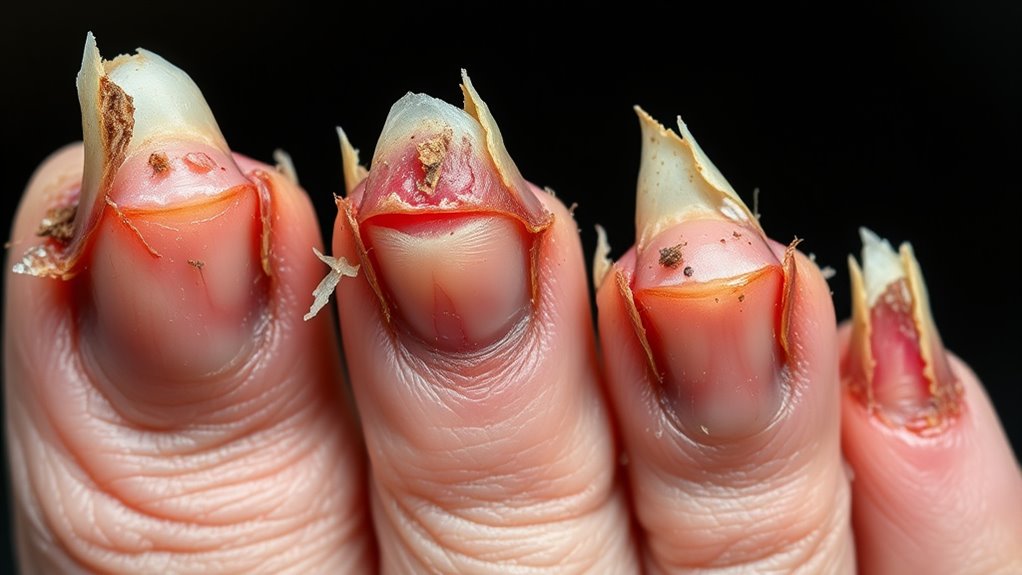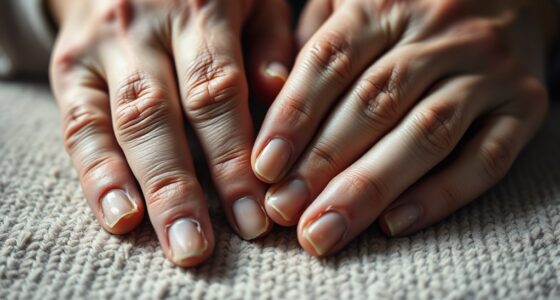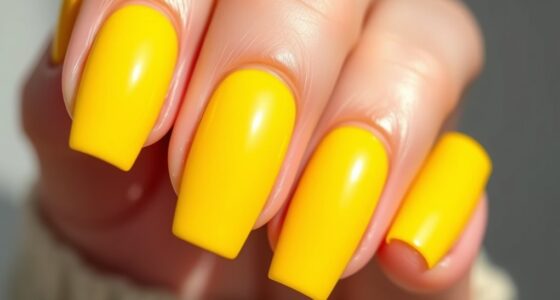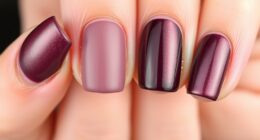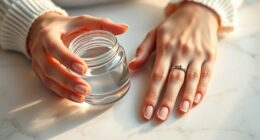Biting your nails causes damage to the nail beds and surrounding skin, making your nails brittle, weak, and prone to splitting or deforming. It can lead to infections from bacteria entering open wounds and cause inflammation, redness, and bleeding. Over time, your nails may develop ridges, uneven surfaces, or look ragged and damaged. Persistent biting hinders proper growth and healing, and if you keep at it, you’ll find out what further harm awaits.
Key Takeaways
- Nail biting damages the nail bed and cuticles, leading to uneven, deformed, or ragged nails.
- Repeated trauma causes nails to become brittle, peel, split, and grow unevenly.
- Biting creates open wounds that increase the risk of bacterial and fungal infections around the nails.
- Continuous biting can cause nail ridges, deformities, and slow down natural nail growth.
- Habitual biting hampers proper nail healing and can lead to persistent nail and skin damage.

Have you ever wondered what nail biting can do to your health? It might seem like a harmless habit, but it actually affects your nail health in many ways. When you bite your nails, you’re constantly putting stress on the delicate tissues surrounding your nails, which can lead to damage of the cuticles and nail beds. Over time, this damage can cause your nails to become brittle, weak, and prone to breakage. The repetitive biting can also prevent proper nail growth, leaving your nails uneven or deformed. If you notice your nails often peeling or splitting, it’s likely because of the ongoing trauma from biting. Additionally, nail biting can lead to infections, as your mouth carries bacteria that can be transferred to the open skin around your nails. This increases the risk of bacterial or fungal infections, which can further compromise nail health.
Understanding what triggers your biting habits is vital if you want to break free from this cycle. Biting triggers are often associated with stress, anxiety, boredom, or concentration. When you’re feeling overwhelmed or restless, your fingers become an outlet for nervous energy. Sometimes, you might bite your nails unconsciously while watching TV, working at your desk, or during moments of deep thought. Recognizing these triggers can help you develop healthier coping strategies. For example, if stress causes your nail biting, practicing relaxation techniques like deep breathing or mindfulness can reduce the urge. If boredom is the cause, keeping your hands busy with a stress ball or fidget toy offers a productive alternative.
It’s also worth noting that habitual nail biting can become a subconscious response to triggers, making it harder to control over time. The more you bite, the more reinforced the habit becomes, creating a cycle that’s difficult to break without awareness and effort. Your nails may appear ragged or uneven, and you might notice hangnails or bleeding cuticles, which only worsen nail health and increase discomfort. Moreover, persistent biting can lead to beaus lines—horizontal ridges that develop across the nails—and other deformities that diminish the aesthetic appeal of your nails. The damage isn’t just superficial; it can cause lasting harm that takes time and care to repair. Regular nail biting can also interfere with proper nail growth and healing, making recovery slower and more challenging.
Frequently Asked Questions
Can Nail Biting Cause Permanent Damage to the Nail Bed?
Nail biting can indeed cause permanent damage to your nail bed if it becomes chronic. Repeated biting may lead to nail bed damage, resulting in permanent nail injury and abnormal nail growth. The constant trauma can also cause the skin around your nails to become inflamed or infected. If you keep biting, you risk long-term damage, so breaking this habit early is essential to prevent permanent harm to your nails.
Is Nail Biting Linked to Any Mental Health Conditions?
Nail biting is often linked to mental health conditions like anxiety disorders and obsessive-compulsive behaviors. When you bite your nails, it may serve as a coping mechanism to relieve stress or manage anxious feelings. This habit can become a compulsive action, making it harder to break free. Recognizing this connection might encourage you to seek healthier ways to deal with anxiety and reduce nail biting over time.
How Does Nail Biting Affect Dental Health?
Did you know that 60% of people who bite their nails also struggle with poor oral hygiene? Biting your nails can chip or damage your tooth enamel, increasing the risk of cavities and sensitivity. It also introduces bacteria from your nails into your mouth, leading to infections. To protect your dental health, stop biting your nails and maintain regular dental checkups, ensuring your teeth stay strong and clean.
Are There Effective Treatments for Stopping Nail Biting?
To stop nail biting, you can try behavior modification techniques like habit reversal. Identify triggers that lead you to bite and replace the habit with healthier actions, such as squeezing a stress ball. Consistency is key, so stay committed and consider seeking support from a therapist if needed. These strategies help break the cycle and promote healthier nail habits over time.
Does Nail Biting Increase the Risk of Infections?
Biting your nails can increase the risk of infections because it exposes you to fingernail germs. When you bite, you transfer bacteria from your nails to your mouth, raising chances of bacterial transfer and infections. These germs can cause illnesses or skin infections around your nails. To stay healthier, avoid biting and keep your nails clean, reducing the chance of harmful bacteria entering your body through your mouth.
Conclusion
While nail biting might seem harmless or even comforting, it secretly chips away at your nails and exposes you to germs. The damage contrasts sharply with the brief relief it provides, highlighting how a small habit can have lasting consequences. So, next time you’re tempted to bite, remember: what feels like a quick fix could lead to long-term harm, reminding you that sometimes, the biggest risks come from the tiniest actions.
